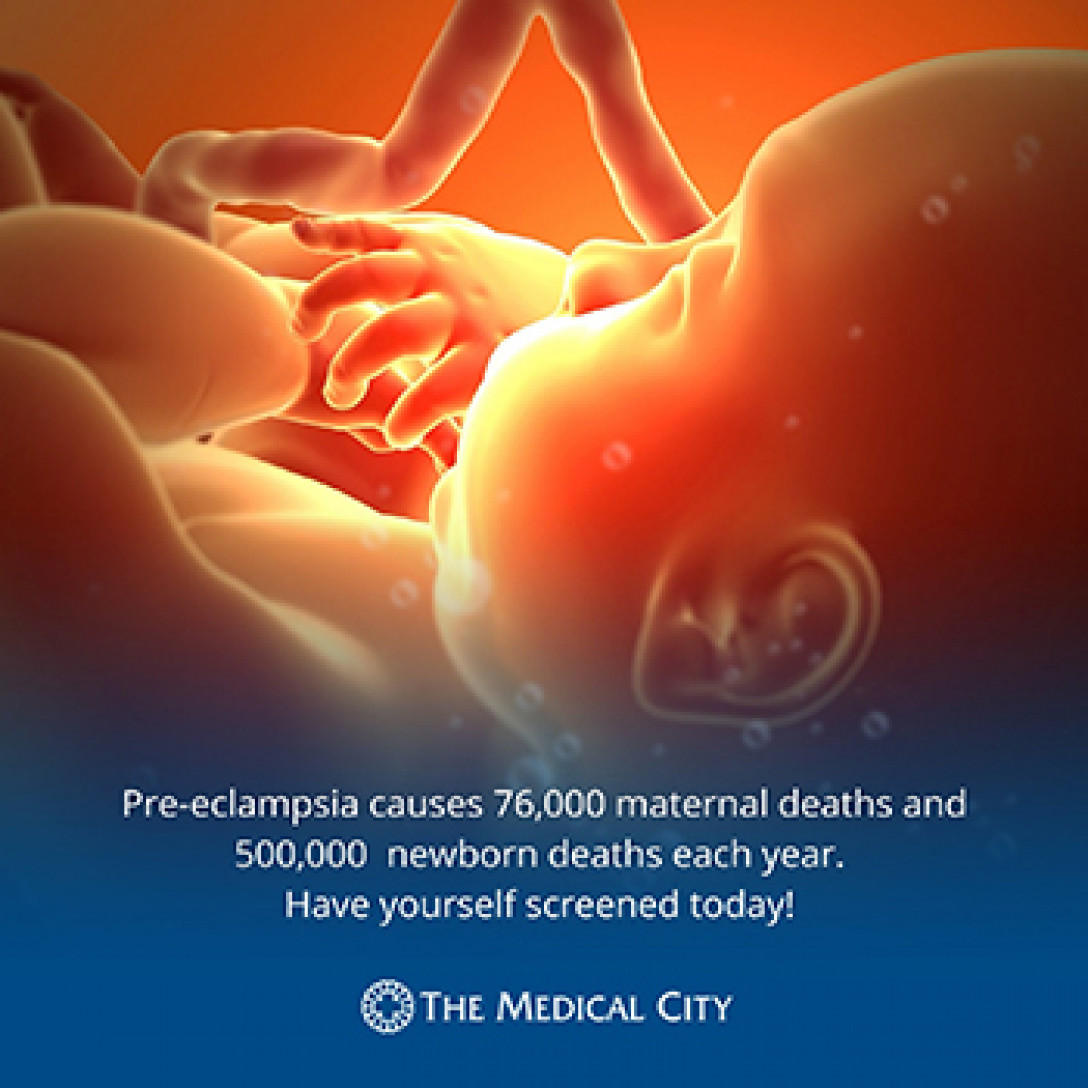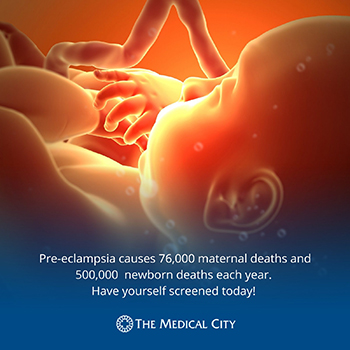News
Early Detection Saves Lives: Pre-eclampsia Screening and Management
By | May 15, 2020

Pre-eclampsia is a condition characterized by an increase in blood pressure among pregnant women. This condition affects two to five percent of pregnant women resulting in 76, 000 maternal deaths and a higher risk of premature delivery with 500,000 newborn deaths annually worldwide.
Pre-eclampsia is a condition characterized by an increase in blood pressure among pregnant women. This condition affects two to five percent of pregnant women resulting in 76, 000 maternal deaths and a higher risk of premature delivery with500, 000 newborn deaths annually worldwide.
In 2015, around 1,721 maternal deaths were registered in the Philippines with eclampsia as the leading cause followed by gestational hypertension and proteinuria (increased levels of protein in the urine).
Risk Factors
Symptoms
Unmanaged pre-eclampsia may lead to complications affecting both mother and child. These complications include the following:
Another complication of pre-eclampsia is the HELLP Syndrome which stands for the main symptoms associated with the syndrome.
Hemolysis (rupture or destruction of red blood cells)
Elevated Liver enzymes
Low Platelet count
Women who have had the HELLP Syndrome in a previous pregnancy have a 40% chance of having pre-eclampsia again in their future pregnancy.
Women with pre-eclampsia will be monitored by their healthcare provider until the baby can be delivered at 37-38 weeks of gestation.
The comprehensive approach to preventing pre-eclampsia can be strengthened by provider education, consistent adherence to clinical guidelines, and an improvement in the referral system.
At The Medical City’s Institute for Women’s Health, the Section of Maternal-Fetal Medicine has a comprehensive predictive, preventive, and precise approach to the diagnosis and management of pre-eclampsia.
An analysis of data in 2018 showed that around 10% of births at TMC have hypertensive disorders during pregnancy. The same data shows the common conditions seen among these pregnant women and how they relate to the chance of babies born to these mothers of having related health issues.
Figure 1. Data on Screening for Pre-eclampsia at The Medical City.
TMC’s Women’s Health Care Center offers prenatal screening for pre-eclampsia across all gestational ages, including first, second, and third trimester screening.
The recommendation to screen all women for pre-eclampsia helps ensure early detection of the condition.With the help of this screening program, TMC is able to detect a 89.94% of all pre-eclampsia in pregnant women.
Figure 2. First Trimester Screening for Pre-eclampsia Detection Rate at The Medical City.
Most women feel fine until initial symptoms begin to manifest in the middle of the pregnancy. The early detection of pre-eclampsia ensures better outcomes for both mother and child as appropriate management is implemented in a timely manner.
To help prevent pre-eclampsia, it is recommended that all pregnant women are screened for preterm pre-eclampsia during the 11th-13th week of pregnancy. Early detection and preventioncan save lives.
For inquiries, you may contact
Women’s Health Care Center (WHCC)
6th Floor Nursing Tower 2
The Medical City
Tel. No.: (632) 8-8988-1000/8-988- 7000 ext. 6336 / 6645
References:
Early Detection Saves Lives: Pre-eclampsia Screening and Management
By ,
May 15, 2020

Pre-eclampsia is a condition characterized by an increase in blood pressure among pregnant women. This condition affects two to five percent of pregnant women resulting in 76, 000 maternal deaths and a higher risk of premature delivery with 500,000 newborn deaths annually worldwide.
Pre-eclampsia is a condition characterized by an increase in blood pressure among pregnant women. This condition affects two to five percent of pregnant women resulting in 76, 000 maternal deaths and a higher risk of premature delivery with500, 000 newborn deaths annually worldwide.
In 2015, around 1,721 maternal deaths were registered in the Philippines with eclampsia as the leading cause followed by gestational hypertension and proteinuria (increased levels of protein in the urine).
Risk Factors
Symptoms
Unmanaged pre-eclampsia may lead to complications affecting both mother and child. These complications include the following:
Another complication of pre-eclampsia is the HELLP Syndrome which stands for the main symptoms associated with the syndrome.
Hemolysis (rupture or destruction of red blood cells)
Elevated Liver enzymes
Low Platelet count
Women who have had the HELLP Syndrome in a previous pregnancy have a 40% chance of having pre-eclampsia again in their future pregnancy.
Women with pre-eclampsia will be monitored by their healthcare provider until the baby can be delivered at 37-38 weeks of gestation.
The comprehensive approach to preventing pre-eclampsia can be strengthened by provider education, consistent adherence to clinical guidelines, and an improvement in the referral system.
At The Medical City’s Institute for Women’s Health, the Section of Maternal-Fetal Medicine has a comprehensive predictive, preventive, and precise approach to the diagnosis and management of pre-eclampsia.
An analysis of data in 2018 showed that around 10% of births at TMC have hypertensive disorders during pregnancy. The same data shows the common conditions seen among these pregnant women and how they relate to the chance of babies born to these mothers of having related health issues.
Figure 1. Data on Screening for Pre-eclampsia at The Medical City.
TMC’s Women’s Health Care Center offers prenatal screening for pre-eclampsia across all gestational ages, including first, second, and third trimester screening.
The recommendation to screen all women for pre-eclampsia helps ensure early detection of the condition.With the help of this screening program, TMC is able to detect a 89.94% of all pre-eclampsia in pregnant women.
Figure 2. First Trimester Screening for Pre-eclampsia Detection Rate at The Medical City.
Most women feel fine until initial symptoms begin to manifest in the middle of the pregnancy. The early detection of pre-eclampsia ensures better outcomes for both mother and child as appropriate management is implemented in a timely manner.
To help prevent pre-eclampsia, it is recommended that all pregnant women are screened for preterm pre-eclampsia during the 11th-13th week of pregnancy. Early detection and preventioncan save lives.
For inquiries, you may contact
Women’s Health Care Center (WHCC)
6th Floor Nursing Tower 2
The Medical City
Tel. No.: (632) 8-8988-1000/8-988- 7000 ext. 6336 / 6645
References: